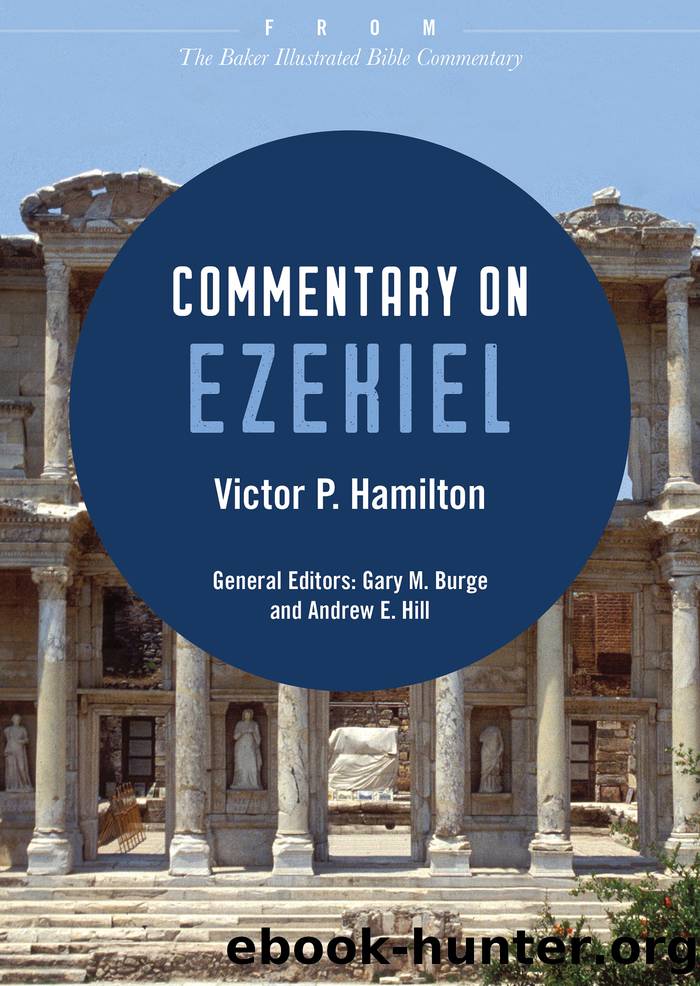Commentary on Ezekiel by Victor P. Hamilton

Author:Victor P. Hamilton [Burge, Gary M. and Andrew E. Hill]
Language: eng
Format: epub
Tags: Bible Commentary/Old Testament, REL006050, REL006060
ISBN: 9781493424603
Publisher: Baker Publishing Group
Published: 2019-10-24T00:00:00+00:00
Metal cauldrons can be seen along the top of this Assyrian relief depicting captured prisoners and plundered goods (865â860 BC). [Copyright © Baker Photo Archive. Courtesy of the British Museum.]
Oholibah tops her sister by one, for she has even a third loverâChaldeans (23:14). What happened to her older sister fails to deter her from her own promiscuity. History as a great teacher is ignored. She even goes so far as to paint pictures or sketch drawings in red of her lover to be (23:14). Oholibah is so obsessed with lust that she is unable to fetch enough lovers.
Oholibahâs lovers will turn against her as brutally as Oholahâs did. What Oholibah thinks will be her enjoyment and salvation turns out to be her destroyer. Oholibah/Judah/Jerusalem made one very grave mistake. She looked for salvation in the wrong places. Political alliances with border superpowers, she thought, would save her. How blind! Since when do Godâs chosen people think they will find greater satisfaction and enjoyment in the nations of the earth than in the Lord of those nations?
To be sure, this is not an innovation of Ezekielâs contemporaries. Earlier prophets (Isa. 7:1â8:22; 30:1â31:9; Jer. 2:20â25; Hos. 7:11â13; 8:9) condemned their generation for fornicating with Gentiles, for pursuing alliances with foreign nations. Godâs people have become the Lordâs unfaithful wife. As her husband, the Lord demands of Israel exclusive fidelity. That is what he has given her, and she needs to reciprocate. If she insists on multiple suitors, then Godâs only course of action will be to abandon her.
W. A steaming cauldron (24:1â27). Again the date is very precise. It is the ninth year, tenth month, tenth day (January 588 BC). It is the day on which Nebuchadnezzar laid siege to Jerusalem.
On this dark day the prophet is told to put a cooking pot on the fire and place water and choice pieces of meat in it. Already in Ezekiel 11:3 Jerusalemites have referred to their city as a cooking pot and to themselves as choice morsels. The pot provides protection and insulation, they think. Not only are they wrong on that count; they are also incorrect in equating themselves with choice pieces of meat. In fact, their victims are the choice morsels (Ezek. 11:7).
Chapter 24 expands on chapter 11 by including the fire beneath the pot, something on which the metaphor makers of chapter 11 had not banked. The pot, far from being a shelter, will char and incinerate. In fact, the Lord himself will pile the wood under the cauldron. Once again, the message is sounded that those who survived the deportation of 597 BC are not thereby granted immunity from subsequent disaster. Their complacency is about to be shattered.
On the heels of this incident, Ezekiel is told that his wife will die (24:16). Ezekiel is not alone in weaving his familial experiences into his prophetic message (see Hos. 1:1â3:5; Isa. 7:3â9; 8:1â4). While Jeremiah is denied the normal enjoyments of life (with Jer. 16:2 supplying the only instance of a
Download
This site does not store any files on its server. We only index and link to content provided by other sites. Please contact the content providers to delete copyright contents if any and email us, we'll remove relevant links or contents immediately.
| New Testament | Old Testament |
The Five People You Meet in Heaven by Mitch Albom(3549)
The Secret Power of Speaking God's Word by Joyce Meyer(3154)
Real Sex by Lauren F. Winner(3002)
Name Book, The: Over 10,000 Names--Their Meanings, Origins, and Spiritual Significance by Astoria Dorothy(2967)
The Holy Spirit by Billy Graham(2938)
0041152001443424520 .pdf by Unknown(2842)
How The Mind Works by Steven Pinker(2811)
ESV Study Bible by Crossway(2772)
Ancient Worlds by Michael Scott(2675)
Churchill by Paul Johnson(2576)
The Meaning of the Library by unknow(2561)
The ESV Study Bible by Crossway Bibles(2546)
The Gnostic Gospels by Pagels Elaine(2517)
MOSES THE EGYPTIAN by Jan Assmann(2410)
Jesus by Paul Johnson(2349)
City of Stairs by Robert Jackson Bennett(2337)
The Complete Dead Sea Scrolls in English (7th Edition) (Penguin Classics) by Geza Vermes(2269)
The Nativity by Geza Vermes(2221)
Ancient Near Eastern Thought and the Old Testament by John H. Walton(2219)
